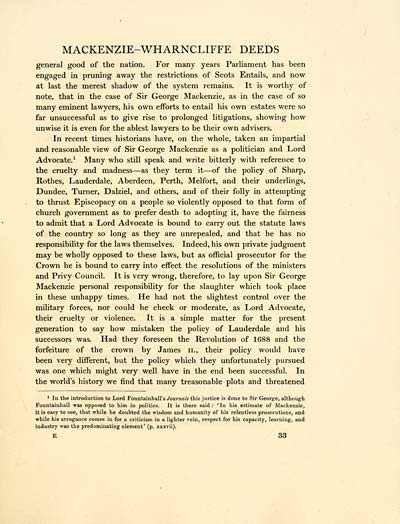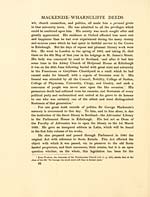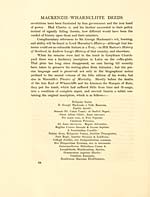Download files
Complete book:
Individual page:
Thumbnail gallery: Grid view | List view

MACKENZIE-WHARNCLIFFE DEEDS
general good of the nation. For many years Parliament has been
engaged in pruning away the restrictions of Scots Entails, and now
at last the merest shadow of the system remains. It is worthy of
note, that in the case of Sir George Mackenzie, as in the case of so
many eminent lawyers, his own efforts to entail his own estates were so
far unsuccessful as to give rise to prolonged litigations, showing how
unwise it is even for the ablest lawyers to be their own advisers.
In recent times historians have, on the whole, taken an impartial
and reasonable view of Sir George Mackenzie as a politician and Lord
Advocate. 1 Many who still speak and write bitterly with reference to
the cruelty and madness — as they term it — of the policy of Sharp,
Rothes, Lauderdale, Aberdeen, Perth, Melfort, and their underlings,
Dundee, Turner, Dalziel, and others, and of their folly in attempting
to thrust Episcopacy on a people so violently opposed to that form of
church government as to prefer death to adopting it, have the fairness
to admit that a Lord Advocate is bound to carry out the statute laws
of the country so long as they are unrepealed, and that he has no
responsibility for the laws themselves. Indeed, his own private judgment
may be wholly opposed to these laws, but as official prosecutor for the
Crown he is bound to carry into effect the resolutions of the ministers
and Privy Council. It is very wrong, therefore, to lay upon Sir George
Mackenzie personal responsibility for the slaughter which took place
in these unhappy times. He had not the slightest control over the
military forces, nor could he check or moderate, as Lord Advocate,
their cruelty or violence. It is a simple matter for the present
generation to say how mistaken the policy of Lauderdale and his
successors was. Had they foreseen the Revolution of 1688 and the
forfeiture of the crown by James n., their policy would have
been very different, but the policy which they unfortunately pursued
was one which might very well have in the end been successful. In
the world's history we find that many treasonable plots and threatened
1 In the introduction to Lord Fountainhall's Journals this justice is done to Sir George, although
Fountainhall was opposed to him in politics. It is there said : 'In his estimate of Mackenzie,
it is easy to see, that while he doubted the wisdom and humanity of his relentless prosecutions, and
while his arrogance comes in for a criticism in a lighter vein, respect for his capacity, learning, and
industry was the predominating element' (p. xxxvii).
E 33
general good of the nation. For many years Parliament has been
engaged in pruning away the restrictions of Scots Entails, and now
at last the merest shadow of the system remains. It is worthy of
note, that in the case of Sir George Mackenzie, as in the case of so
many eminent lawyers, his own efforts to entail his own estates were so
far unsuccessful as to give rise to prolonged litigations, showing how
unwise it is even for the ablest lawyers to be their own advisers.
In recent times historians have, on the whole, taken an impartial
and reasonable view of Sir George Mackenzie as a politician and Lord
Advocate. 1 Many who still speak and write bitterly with reference to
the cruelty and madness — as they term it — of the policy of Sharp,
Rothes, Lauderdale, Aberdeen, Perth, Melfort, and their underlings,
Dundee, Turner, Dalziel, and others, and of their folly in attempting
to thrust Episcopacy on a people so violently opposed to that form of
church government as to prefer death to adopting it, have the fairness
to admit that a Lord Advocate is bound to carry out the statute laws
of the country so long as they are unrepealed, and that he has no
responsibility for the laws themselves. Indeed, his own private judgment
may be wholly opposed to these laws, but as official prosecutor for the
Crown he is bound to carry into effect the resolutions of the ministers
and Privy Council. It is very wrong, therefore, to lay upon Sir George
Mackenzie personal responsibility for the slaughter which took place
in these unhappy times. He had not the slightest control over the
military forces, nor could he check or moderate, as Lord Advocate,
their cruelty or violence. It is a simple matter for the present
generation to say how mistaken the policy of Lauderdale and his
successors was. Had they foreseen the Revolution of 1688 and the
forfeiture of the crown by James n., their policy would have
been very different, but the policy which they unfortunately pursued
was one which might very well have in the end been successful. In
the world's history we find that many treasonable plots and threatened
1 In the introduction to Lord Fountainhall's Journals this justice is done to Sir George, although
Fountainhall was opposed to him in politics. It is there said : 'In his estimate of Mackenzie,
it is easy to see, that while he doubted the wisdom and humanity of his relentless prosecutions, and
while his arrogance comes in for a criticism in a lighter vein, respect for his capacity, learning, and
industry was the predominating element' (p. xxxvii).
E 33
Set display mode to:
![]() Universal Viewer |
Universal Viewer | ![]() Mirador |
Large image | Transcription
Mirador |
Large image | Transcription
Images and transcriptions on this page, including medium image downloads, may be used under the Creative Commons Attribution 4.0 International Licence unless otherwise stated. ![]()
| Histories of Scottish families > Ancient deeds and other writs in the Mackenzie-Wharncliffe charter-chest > (55) Page 33 |
|---|
| Permanent URL | https://digital.nls.uk/95524025 |
|---|
| Description | A selection of almost 400 printed items relating to the history of Scottish families, mostly dating from the 19th and early 20th centuries. Includes memoirs, genealogies and clan histories, with a few produced by emigrant families. The earliest family history goes back to AD 916. |
|---|

